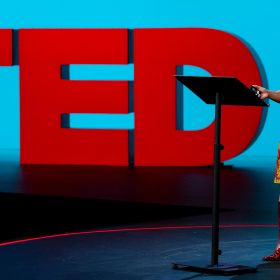
You don't have to leave your neighborhood to live in a better one | Majora Carter
21 September 2022 - 17 minsLow-status neighborhoods in the US are often stuck between stagnating assistance from the government and gentrification at the hands of real estate developers. The result is that the brightest minds are convinced that "success" means leaving town. Urban revitalizer Majora Carter has a solution: What if we treated these communities like struggling companies? She presents a restorative economic approach to capitalism, which seeks to retain talent, build resilient communities and prove that you don't have to move out of your neighborhood to live in a better one.

A new vision of healthy masculinity | Davonte Green
What does it actually mean to be a "real man" these days? In a personal talk packed with actionable advice, youth advocate Davonte Green challenges age-old stereotypes about masculinity, showing that emotional intelligence and self-control — not aggression — are the keys to moving through the world with confidence and strength. Hosted on Acast. See acast.com/privacy for more information.
13 mins
29 April Finished

Feeling stressed? The answer isn’t to “just relax” | Aditi Nerurkar
Stress isn’t all bad. In fact, the right kind can fuel growth instead of burnout. In this actionable discussion, physician and author Aditi Nerurkar shares tips for managing your stress, boosting your confidence and increasing your resilience. Discover how to spot your stress signals before they spiral — and turn pressure into progress. (This live conversation was hosted by TED’s Whitney Pennington Rodgers and was part of a TED Membership event. Visit ted.com/membership to support TED today and join more exclusive events like this one.) Hosted on Acast. See acast.com/privacy for more information.
58 mins
28 April Finished

Sunday Pick: How poetry builds teenagers' confidence (w/ Youth Poet Laureate Naisha Randhar) | How to Be a Better Human
In honor of National Poetry Month, Chris is speaking with Naisha Randhar. Naisha is the Youth Poet Laureate of Dallas, the author of Roses of Arma, and the youngest guest Chris has ever interviewed — she’s a high school sophomore. Chris and Naisha talk about the inspiring work of teaching teenagers poetry and how to balance self-awareness with self-confidence. Naisha also encourages listeners to be witnesses more than interpreters and how it’s equally important to witness yourself and your presence in the world. For the full text transcript, visit go.ted.com/BHTranscripts Hosted on Acast. See acast.com/privacy for more information.
41 mins
27 April Finished

The climate movement needs new stories — here's mine | Fenton Lutunatabua
"We are not drowning. We are fighting," says storyteller Fenton Lutunatabua, echoing the mantra of the climate activists he works with across the Pacific. He shares stories of the people and communities at the front lines of the climate crisis, proving they're not waiting to be saved — they're demanding action and putting up a fierce fight for the future. Hosted on Acast. See acast.com/privacy for more information.
9 mins
26 April Finished

How to speak up — even when you don’t want to | Sarah Crawford-Bohl
What stops you from speaking up when it matters most? Healthcare leader Sarah Crawford-Bohl offers a practical, compassionate framework to have difficult conversations with clarity and heart — and shows how it can lead to stronger teams and real impact. Hosted on Acast. See acast.com/privacy for more information.
13 mins
25 April Finished

The AI arsenal that could stop World War III | Palmer Luckey
AI in warfare is no longer hypothetical; it's inevitable, says Palmer Luckey, an inventor and founder of the defense technology company Anduril Industries. He takes us inside the high-tech arms race to build AI-powered weapons, "killer robots" and autonomous fighter jets at scale — and makes the counterintuitive case for why this may be the surest path to deterrence and lasting peace. (Followed by Q&A with technologist Bilawal Sidhu) Hosted on Acast. See acast.com/privacy for more information.
16 mins
24 April Finished





















